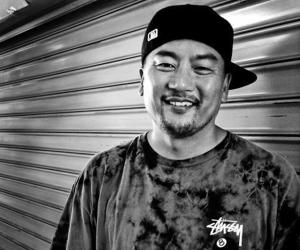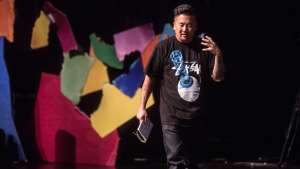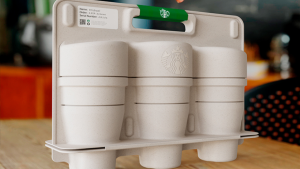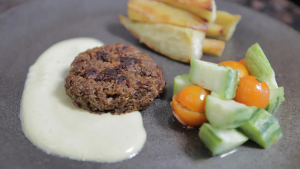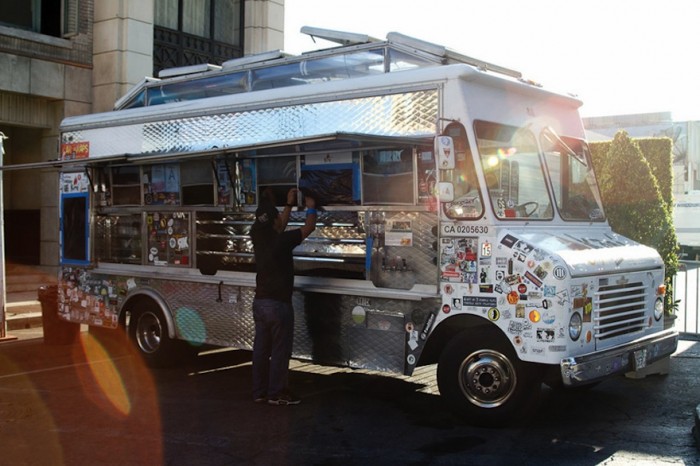
Roy Choi has revolutionized food truck culture, by bringing gourmet cooking to the masses with good, wholesome ingredients. Having co-founded Kogi BBQ trucks alongside Mark Manguera and Caroline Shin, in 2008, he has since taken the LA streets by storm, feeding locals with a fusion of Korean and Mexican flavors, offering up menu items such as the Kogi kimchi quesadilla, tofu and spicy pork tacos and burritos, spicy short rib sliders, and sriracha chocolate bars for dessert.
"I am a chef, so for me words are usually in a direct format where I am giving a direct order. (…) As a cook that is really the way I express myself. Cooking is nurturing. I think there has to be more than the brains and the words to share information. We were moving people, crowds, neighbourhoods without using many words. We were feeding stomachs."
Choi’s passion for food and craving to nourish the body, soul and community with real, fresh ingredients has lead him to work on a new project with fellow chef and owner of Coi, Daniel Patternson. Loco’l aims at breaking down the current standards of the fast food industry, and revolutionizing it by bringing forward delicious and affordable meals that are usually not associated with that culture — its about bringing in chefs, and not the big corporations, to feed the people.
For the duo, Loco’l is about getting back to basics. There’s a belief that fast food chains were not always seen as evil institutions. But somehow, along the way, business grew, money started to get in the way, and the way in which decisions were being made changed. Rather than trying to preach to existing fast food establishments, Loco’l will stand as a competitor, working side-by-side with these franchises, to make them listen and create real change behind the types of fare people are being served within the market.
In short, Loco’l is like a punk rock label. It is a fast food restaurant run by some of the best chefs in the world and the brightest minds in technology from California, merging them together with the spirit and soul of their grandmothers, to try and take care and feed everyone — making meals that are affordable, but delicious. The aim is create a new co-op economy that works directly with farmers, and uses technology to create apps to source ingredients from the local supply chain, redirecting and making great food accessible to all. The all-star team of Roy Choi and Daniel Patterson are joined by Rene Redzepi, chef and co-owner of NOMA, founder of MAD; Scott Kester, founder and owner of Scott Kester Design; and David Irvin, principal and creative director at Folklor; and Mark Stech-Novak, founder and owner of Mark Stech-Novak restaurant consultations and design.
Designboom sat down with Roy Choi to discuss his thoughts on food, and his overall vision for Loco’l:
Designboom: What is your vision for Loco’l?
Roy Choi: Up until now, I’ve kept my life dreams very strong, but also very local and limited. I’ve kept it underground, I’ve kept it within my city, I’ve kept it within my family; and with Loco’l, I found the courage to go worldwide. Everywhere. Everywhere there is fast food, I want Loco’l to go. It’s not just for business, it’s this mission to feed. So that’s the dream. Daniel (co-founder) always says a million stories, but for us we say that in hyperbole, because for us as chefs we don’t think that way, you know? We don’t think about having a million restaurants. We think about having one good restaurant, and serving one great meal. Like my friend in Modena, Massimo Bottura. We are craftsmen and artisans. That’s who we are, that’s what our spirit is, so we’re really challenging ourselves to make it big.
For business people, that’s what you strive for in many cases — to be in as many markets as possible. To make a lot of money, to go public, and become Prada, you know? Many businesses think that way, but for chefs, we don’t think that way. So, it’s a really big challenge for us. We keep pushing it out there in our mind. Let’s have a million stores. Let’s be everywhere, and that is like a fight with our brain, and so that’s what we do. We just want to be everywhere.
Designboom: What is the price range?
Roy Choi: 99 cents to six dollars. This is not fast food plus. This is fast food. So what we’re trying to do is feed everyone that is eating and can only afford fast food in their lives, and in America we have a lot. In Europe, maybe not so much, but you still have it. But Europe is a different puzzle. You guys don’t have to eat fast food. You guys have your regular sort of homestyle dishes. You can just eat a bowl of pasta with some dandelion greens, and some shaved cheese and that is an affordable meal. In America, most of the people living in our country can’t have that. They can only have this processed food, and that, over generations, shapes the society… keeps people down. And so what we want to do is just get in there and cook really good food. You know, even if the business doesn’t become profitable the first couple of years, that’s okay, as long as we can create this model.
Designboom: How can you create quality food that costs so little? Where do you buy the ingredients?
Roy Choi: There are a lot of ways. We as chefs have relationships with a lot of farmers. We’ve been building a relationship for many, many years, and now’s a chance for us to really challenge those relationships. That’s one way. Another way is that, there’s a big problem in America where we throw away more food than we actually use, because America’s built this psychology of food having to be perfect and pretty — vegetables, fruits, things like that. So, if you take 100% of the vegetables and fruits grown, maybe only 30-40% of that is used. The rest of it, because it’s bruised or scratched, all gets thrown away. So, what we’re thinking is really using that food and those vegetables and employing a zero waste model, and then utilizing all the peels, all the scraps. All of our recipes are built around chopping almost making like a bolognese, where everything is chopped and cooked and stewed. In this way we can just mix everything together. Then there’s also the concentration of flavor so you don’t have to give more than you need to if the food is delicious. With this we go back to Italian food. If you have a really well-cooked bowl of risotto, it’s not like you need a large amount, right? You need a moderate serving; and as long as the skill and the craft is there, that’s just effort, and doesn’t cost money. That’s how we’re going to do it.
Designboom: In your opinion, what is the link between food and mental health and physical health?
Roy Choi: To me it’s everything. Not only mental, physical, but also brain development, education, attention span. The puzzle to all these problems is much deeper than just food. Food is one component of it. The other stuff, I don’t even know where to start, because it is so wrapped up in politics, and lobbying, and government, and councilmen, and old laws and things like that… budget cuts. What we can do is at least feed each other better — kids, young kids. Right now a lot of elementary kids in America, and high school and junior high, they are getting even worse food than Mcdonald’s everyday. They are getting the lower end of the processed food. So, if processed food had different levels, they’re getting are getting the lowest end — like right before dog food. That level. The only one below that is prisons and hospitals. So, if you think about it, if we’re feeding all of our kids and future generations this food constantly; and on top of that we’re pulling teachers and resources away; and on top of that there’s racism; and telling them they are not good enough; and on top of that not providing jobs and opportunity, that’s horrible. So what we can do, is at least if we’re feeding them better, the other stuff is still there, but their mind from inside will grow and they can start to see things clearer. That’s what we’re trying to do you know?
Designboom: You are for sure aware that most vegetables are not fertile anymore, and you cannot replant seeds anymore…
Roy Choi: They’ve stripped produce [them] of all their nature basically. It’s like a mirror to our lives. The very things that are important — our culture, humility, caring for each other, nurturing each other — have been stripped away and become unimportant. It’s the same thing with monocultured fruits and vegetables. The very thing that makes them what they are, is being stripped away and washed because it’s too volatile for a large crop. It’s horrible. It’s almost like we need a national park system for our food chain. You know how here we keep building, building, building, and people fight and say okay, you can’t touch this land and it becomes a national park. We almost need that for our food pathways. Like some people need to step up and say you can’t stop everything. Pollution will happen, but this part of our food pyramid is protected.

